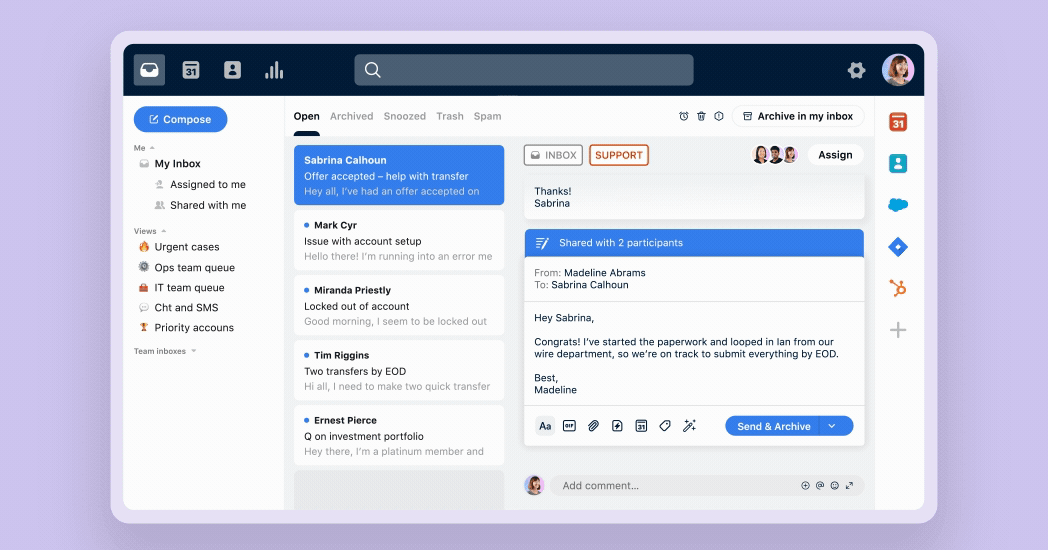Customers have more options than ever to reach businesses with support requests, and while it’s convenient for them, we can’t ignore the challenges this has posed for customer support teams.
Not only do teams face rising request numbers, but high customer expectations have added pressure, too. Customers justifiably want fast, accurate, and personalized service. They key to delivering that kind of high quality support while keeping your support team’s workload in check? A scalable support ticket system. Here, we’ll break down the tools and workflows your team needs to build a ticket management system that’s fit for teams and customers alike.
What is a support ticket, and why do you need a tool for ticket management?
A support ticket, or ticket, is a digital record of an interaction between a customer and a company’s customer support team. With details about the customer, the nature of the query or issue, internal notes, interaction history, and ticket status, support tickets provide teams with a structured way to organize and manage customer interactions so they can ensure that all customers are cared for efficiently.
As a business grows, so does its customer base, and therefore, the volume of customer inquiries they receive. If teams want to be able to handle an increase in customer conversations without compromising good experiences, a scalable support ticket workflow is essential. Without a scalable ticketing system in place, businesses are potentially risking:
Delayed responses: As ticket volumes rise and customer demands remain high, response times can slow down, leading to impatient customers.
Decreased customer satisfaction: Slow, ineffective, or impersonal responses lead to dissatisfied customers, which can negatively impact churn rates and even your brand’s reputation.
Overwhelmed support teams: Without an effective ticketing solution in place, support teams can become overwhelmed with trying to manage high ticket volumes and day-to-day work, leading to burnout and potentially high turnover rates.
To avoid running into these roadblocks, businesses need a scalable ticket management solution that can grow with them, enabling them to maintain efficiency and top-notch customer service along the way.
5 features every support ticket system needs
So, your team needs a ticket management tool. How do you know which to choose? There are a handful of options, including Front. It’s used by businesses of different sizes and industries to manage incoming requests from customers all in one place.
While Front is just one example of an available solution, here are some of the most important features to look for when evaluating support ticketing tools:
1. Omnichannel support
Customers expect to be able to reach businesses on their preferred channel of communication, whether that’s email, live chat, or social media. With the help of omnichannel support, teams are able to centralize customer communications in one platform, making it easy to keep track of all interactions from every channel in a single interface.
Solutions like Front offer opportunities for agents to centralize all tools in one place. With Front’s omnichannel inbox, teams don’t have to jump from tool to tool. Whether an email, text, social media message, live chat, or WhatsApp, teams using Front won’t miss customer inquiries, and their customers will always get the help they deserve.

2. Automation and AI
Automating repetitive tasks such as ticketing routing, or even responses to simple inquiries, saves support teams time so they can focus on tasks that require more attention — tasks like customer requests that need hyper-personalized responses, or complex operational work. And with AI making its way into the customer service realm, teams can boost productivity even further with features like chatbots and draft writing assistance. From speedy chat resolution with improved chatbots to email thread summarization and reply drafting, Front’s AI works alongside support teams to help them be their most productive.
Front’s customizable workflow automation allows users to automatically create and trigger dozens of workflows — think follow-ups, conversation tagging, routing, and more — so teams can spend less time on day-to-day administrative tasks to instead, focus on more important work.

3. Collaboration tools
Effective teamwork is vital for navigating high-volume ticket periods. Collaboration tools enable seamless communication among support agents, allowing them to share insights, discuss complex issues, and provide consistent support.
With Front’s collaboration tools, teamwork is a breeze. Features like team mentions, internal comments, and shared drafts help teams get the best answers to customers, fast, while simplifying processes along the way.

4. Customization and flexibility
Every business, and customer support team, has unique needs. That’s why your ticketing solution needs to be flexible, so you can customize it to the specific needs of your business and team as both grow.
Front works with businesses of different sizes and industries. With more than 110 integrations and an open API, teams can effortlessly connect must-have tools — like a CRM, project management, or marketing automation tool, for example — directly with Front to make the Front platform uniquely theirs.
5. Analytics and reporting
It’s important to note that your ticket management will evolve as your team and business changes. That said, it’s crucial to track performance — both team and individual agents — to identify areas for improvement, and in doing so, teams can optimize their processes and allocate resources more effectively.
With actionable insights around response time, resolution rate, and customer satisfaction, Front’s detailed reporting and analytics help users pinpoint areas of improvement, so teams can be their most efficient and businesses their most successful.

Ticketing 101: How to quickly resolve support tickets
Effective ticket resolution is key to maintaining satisfied customers. Here are a few tips to improve your team’s response times:
Organize tickets by priority
Ticket prioritization ensures that urgent issues are addressed promptly, preventing minor issues from escalating into major ones. Use ticket categorization and tagging to streamline this process and ensure that high-priority issues are always at the top of your team’s list.
Offer self-service options
Offering self-service options for your customers, such as a comprehensive knowledge base, can significantly reduce the volume of incoming tickets. By providing helpful content for customers to find answers on their own, customers can resolve simple issues independently, freeing up support teams, and helping customers get their answers faster.
Lean on templates and automations for faster responses
Templates and automated responses can significantly reduce response times for simple or common inquiries. By having pre-written replies for frequently asked questions or routine issues, support teams can provide quicker and more consistent service.

ebook: 5 support message templates to improve your team’s CSAT
Customer service message templates are an essential tool for achieving exceptional service at scale by ensuring your team’s responses are consistent, fast, and accurate. Are you using the right ones? 💡
Find the right ticketing software
Choosing the right ticketing software is crucial for scaling your customer support. Look for a solution that offers the features your team needs, while also being flexible enough to grow with your business.
Front is a leading customer service solution that combines ticket management with forward-thinking technology like automation and AI into one user-friendly platform, so businesses can scale their support operations with ease.
Ticketing 201: How to scale ticketing as your business grows
Scaling your ticket management requires a proactive approach and of course, iterative improvement. Here are a few proven strategies that position teams to scale effectively:
Anticipate growth and plan proactively
Rather than waiting until ticket volumes become unmanageable for your team, plan your support strategy with future growth in mind. To do so, regularly assess your ticket volume trends and adjust your workflows accordingly to ensure your system can handle increased demand.
Leverage customer data for insights
Data-driven insights can help teams predict common issues and then enable them to preemptively address those issues. For example, Front dashboards display ticket volume over time for specific time periods and show average response time and resolution time for tickets. Teams can analyze ticket data and identify common issues raised by customers, better preparing them to proactively support these requests.
Create and maintain a dynamic knowledge base
A thorough, regularly-updated knowledge base reduces incoming ticket volume by enabling customers to help themselves find answers on their own time. And some knowledge bases, Front’s included, can automatically suggest relevant articles during customer interactions, ultimately eliminating the need for customers to submit support tickets at all.
Develop specialized teams for complex issues
As your business grows — and its needs shift — consider segmenting the support team into specialized groups to handle specific types of inquiries, such as technical support, billing, or onboarding, for example. This enables support agents to narrow their focus and ensure that complex issues are routed to and resolved by the most qualified agents, ultimately improving resolution efficiency and customer satisfaction.
Empower your support team with continuous training
Continuously training your support team will set them up for success when it comes to maintaining high-quality service long term. Implement ongoing training programs that focus on both technical skills and best practices in customer service, and consider offering one-on-one training to agents who need additional support based on individual performance data.
Implement a tiered support system
A tiered support structure can be effective for teams who have a mixture of new agents and seasoned vets and can be great for managing high volumes. Tiered systems prioritize and escalate issues based on complexity, so simple issues can be routed to new agents, while more complex problems are escalated to knowledgeable specialists. By leveraging workflow automation, like Front’s workflows, teams can automatically escalate tickets based on predefined criteria without the need for human intervention.
At Front, for example, we have a tiered support model where support requests are categorized into different tiers based on complexity:
Tier 1: Handles straightforward issues that can be resolved quickly.
Tier 2: Manages more complex problems requiring deeper expertise.
Tier 3: Addresses highly technical or specialized issues.
Regularly review and optimize workflow processes
Regularly reviewing and optimizing team workflows and processes is key to avoiding inefficiencies that inevitably develop over time. Imagine a support team that, over the years, has gradually accumulated procedures for handling common issues. Some agents use different tagging conventions, others might follow outdated escalation processes.
If you schedule periodic audits of support processes, you can identify these inconsistencies and areas for improvement, mitigating budding issues.
Track, organize, and resolve every support ticket — without making customers feel like one
Is your customer support team having a difficult time managing customer relationships? Or perhaps they’ve even missed a handful of inquiries recently, leaving customers frustrated?
With the right solution in place, your team will be empowered to not only handle higher support ticket volumes, but provide more personalized experiences.
Front is a complete modern customer support solution that makes it easy for teams to manage tickets while working together to provide the best customer service possible. Unlike other solutions, Front combines the features of traditional ticketing systems with impactful automation and AI features so teams can increase efficiency while simultaneously improving service quality.
No more missed customers, only happier ones.
Written by Jordan Vanden Heuvel
Originally Published: 1 November 2024











